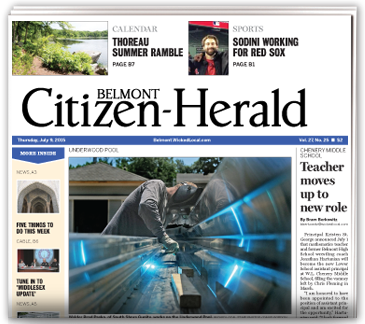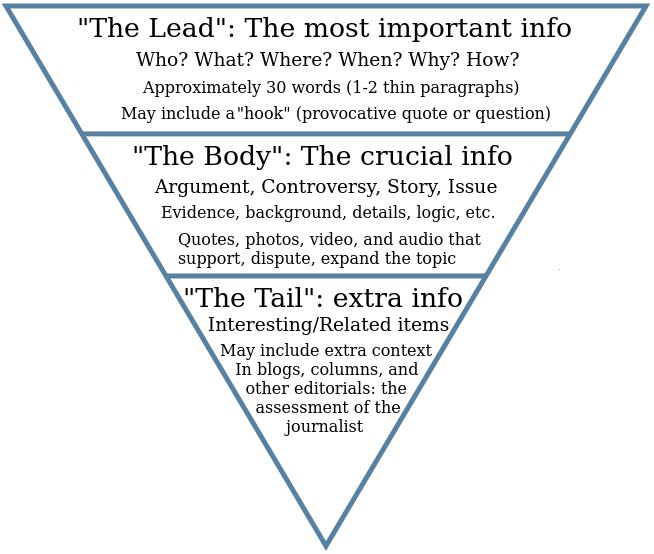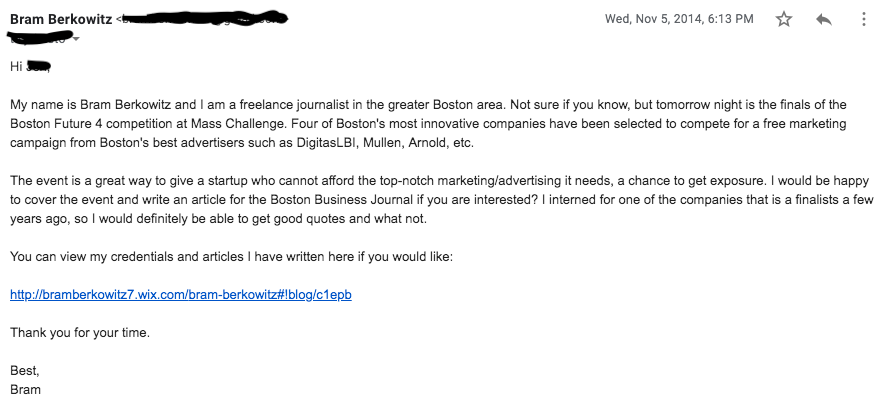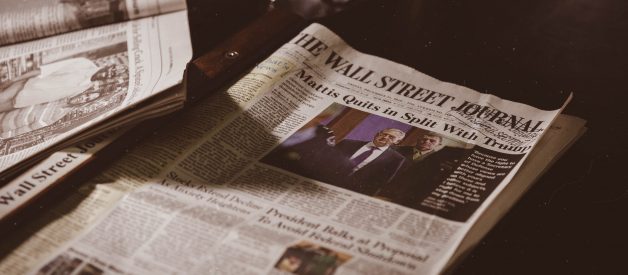Smart incremental steps can help you land your first job in journalism in just months
 Photo: Yang Xia/Unsplash
Photo: Yang Xia/Unsplash
Five years ago, I was a senior at Syracuse University with no writing or reporting experience, no published articles, and certainly no journalism internships to show for.
Fast forward to today and I have been a full-time journalist for almost five years. I?ve held two full-time roles, one at a company that owned many local newspapers, and currently at a trade publication that covers banking and real estate in New England.
I have won multiple first-place awards at the New England Newspaper and Press Association?s annual competition, and have also freelanced for several large regional publications.
Journalism gets a lot of flack these days for its low pay, it?s long grueling nights, and the constant struggle to find a sustainable business model. However, the field has managed to stay popular because it provides people with an empowering experience where they can make a difference, hold the powerful and corrupt accountable and influence public policy.
In fact, The Washington Post reported last year that many college journalism programs were seeing higher enrollment due to all of the controversy surrounding President Trump, and with all of the new ways to tell stories through social media.
Popularity paired with a decline in the number of journalism jobs has made the industry competitive, even at small local publications. While becoming a journalist may seem like a difficult journey to pursue, it is far from impossible.
While I worked hard and never gave up, the path I followed to get to where I am today is very doable for those willing to get their hands dirty and persevere.
After a boring stint in public relations right after college, I threw myself full-throttle into journalism. Within six months, I had lined up a full-time reporting job. It wasn?t with the New York Times, but it was an important first step in the door.
Below, I will share with you the steps I took to break into the industry, which will provide you with a good road map for success.
You Need Samples
You will definitely learn plenty once you have a full-time job, but journalism is not an industry where some editor is going to take a chance on you just because you seem smart and curious.
You need to show some proof that you can put paragraphs together and create a coherent article that clearly informs readers.
The first thing I did when I realized I was interested in journalism as a senior was to apply to be a weekly columnist at the school paper, The Daily Orange.
College papers are a great starting point because they have a wide audience, usually a good digital presence, and are always looking for people to write ? especially if the paper is published daily.
If you are out of college, there are still all sorts of small publications that will be looking for freelancers, although you may end up working for free in the beginning.
In my early days, I was scrounging around for whatever I could get. I did some networking, sent out a lot of emails to editors and checked job sites like JournalismJobs.com, Indeed and Craigslist, and was actually able to land some gigs that left me with good clips (samples).
I believe my first real published clips outside the college newspaper was for a tiny community newspaper and on a site called The Good Men Project, which has a nice following but did not pay writers.
A good first place to look is with your town or city?s community newspaper. These papers are typically understaffed, but well established in the community and will be looking for local people to cover events. While some of these small community papers will be keen to give you a try, some might want to see samples and proof you can do the job, so don?t be discouraged if you cannot get freelance work with a small paper right away.
 One of the first local papers I freelanced for and eventually worked full-time at. Image by Belmont Citizen-Herald.
One of the first local papers I freelanced for and eventually worked full-time at. Image by Belmont Citizen-Herald.
If you can get freelance assignments, it can be a good launch point. These small local papers are often where most journalists get their start, and if they like your work and find you to be a consistent freelancer, they may also extend a full-time offer.
If you can?t find any publication that will let you write for them, just do your own reporting. Start a blog, join Medium or just start doing research on topics you are interested in and cover the news.
If well-written, these articles can serve as samples and help you get freelancing work down the line.
Learn News Writing
If you have been reading the section above and wondering how you will write samples if you have never written a news article before, that is a valid question.
News writing is different from writing an essay because it?s all based on a formula.
Now, I could get into the inverted pyramid or talk about how to structure a lede ? both of which are important to know and good to spend some time on ? but I don?t actually think this is necessary in the very beginning.
 Photo Credit/Ohio State University
Photo Credit/Ohio State University
I have never considered myself that great of a writer.
I think I got in the 500?s on the writing portion of the SATs when they offered it back in the day, although I made substantial improvements in college.
Truthfully, it took a year at my first full-time journalism job of pounding out 10 articles a week to really get good at the news formula.
But you don?t have to be a professional to start covering the news adequately ? we all have to learn at some point.
The best way to start is to read a lot of newspaper articles.
Read a bunch of articles from your local major daily newspaper ? mine is The Boston Globe ? because these outlets are still very focused on traditional journalism.
I find reading the actual print copy of the newspaper is better for learning than for reading online stories, primarily because online stories are laid out differently and use all sorts of different reporting methods with social media (Those methods are good to study as well, especially with how quick the landscape is changing, but to learn the basics print is best).
Observe the way reporters start articles, where they place quotes, how they cite attributions. With some practice, it?s not that hard to pick up.
It?s hard to get good at, but if you are covering a breaking news story or an event, you can definitely find a way as a beginner to fake it until you make it.
Additionally, it might be good to read up on some basic AP style for numbers, commas, and other grammatical aspects of writing. Honestly, though, no one memorizes this, so if you have a question about a particular matter of AP style, just Google it like everyone else.
I still do.
Write an Article for an Established Publication
While it?s good to start writing for any publication you can, eventually you will need to stand out somehow, and the best way is by freelancing for a larger, more established publication. One freelance article in a big publication can do a lot for your resume and network, so don?t be afraid to pitch some of the regional and national publications.
This is not alway easy, but also not as difficult as you might think.
The first thing you should do is research what publication to pitch. Ideally, pick one that you have a good story idea for based on your strengths and interests.
I had originally been an entrepreneurship major at Syracuse and interned at some startups in college, so I knew a little bit about that space and had some good contacts. I figured that one thing I could do was maybe find some promising startups that no one had heard of and write about them.
Based on this advantage, I began reaching out to The Boston Business Journal. In Boston, The Boston Business Journal is very well respected, but not as big as, say, The Boston Herald or The Boston Globe. The publication also covers startups, so it was a good fit.
I sent two pitches to editors at The Boston Business Journal with no response, but I kept trying without being too annoying ? I would send one email every week or two weeks.
I was sitting on the couch in my basement, watching TV, a few days after my third pitch. I had not landed any new freelance work in a few weeks and had been feeling pretty down about my prospects.
 Third pitch email To BBJ. Screenshots by the author.
Third pitch email To BBJ. Screenshots by the author.
Then an email came in from an editor at The Boston Business Journal. He had liked my third idea about covering this fairly new startup contest and gave me my first assignment.
It was a huge breakthrough!
 BBJ Response For First Article
BBJ Response For First Article
Not only did this lead to me writing other articles for The Boston Business Journal, but those articles ultimately became the samples I sent every time I applied for a full-time reporting job.
These clips helped me stand out in the hiring process and one of the editors who hired me at my first full-time journalism gig told me it was having this experience that helped land the job.
Pitching big publications with freelance ideas is not easy and can certainly be frustrating, but if you keep at it and focus on coming up with really unique ideas or trying to find scoops, and target the publications looking for writing in your subject area, I guarantee you will get your shot.
Breaking: Be Available
As you pitch publications and make your presence more known in your perspective market, you will probably get freelancing opportunities to cover breaking news.
Breaking news is demanding. It can happen at any time of the day or night and anywhere. With newspapers and publications spread so thin these days, editors are always on the hunt for people they can call on at the drop of a hat.
While I was interviewing for my first newspaper job and still waiting to hear whether or not I had gotten the job, one of the editors called me and told me there had a been a big fire in the town she covered, and wanted to see if I could cover it as a freelancer.
I hopped on the opportunity, jumped in my car and made it in time to get some interviews with firefighters putting out the blaze.
Was it my best work? No. Did I forget to ask about a few important details? Yes (you can look at the story here).
The lede is awful and it has poor structure, but I think it showed my eventual editor how I work and that I could be composed enough to deal with something like a fire story. It?s hard to show off these skills in an interview.
I got the job.
When editors need a quick reporter to cover breaking news, they are less interested in skill level and more interested in who is available and willing to throw themselves into the mix.
Another reporter I used to work with once got to cover a breaking story for the Associated Press when he was just starting out. Sure, he had to drive far away and it was late at night, but a story in a global publication like the AP is worth more than the value of 10 stories in a small publication that no one has ever heard of.
I also know that Reuters looks for backup reporters they can call upon to fill in at a moment?s notice, and other wire services do this as well.
Send emails to editors at bigger publications and let them know you are willing to fill in for breaking news if needed ? it is a great way to get your foot in the door and show you can handle the pressure.
How to Cover Breaking News
Now, that we have established how helpful covering breaking news can be on your journey toward your first full-time reporting job, I want to go over some tips on how to actually do this type of reporting because it can be overwhelming.
As a freelancer, you will get all sorts of different assignments whether its breaking news or event coverage or an in-depth assignment with multiple interviews required.
But while the latter assignments come with the luxury of time, guidance from your editor and being able to do research, breaking news is its own animal ? and the reality is you are getting thrown into the lion?s den.
When a breaking news story hits, there likely won?t be a lot of instruction or direction because your assigning editor will be in the dark just like you are.
The scene will be chaotic and you will probably get nervous.
Even after covering fires, bank robberies, and protests multiple times at my first reporting job, where there was a lot of breaking news, I would still always get a little nervous.
The good news is the assigning editor will likely know you are a beginner, so they will not expect all-star work. However, you still want to do thorough and concise reporting, and, most importantly, not make any big mistakes.
Mediocre work when you are a beginner will not kill your career, but big mistakes out in the field can hurt your reputation with that publication.
That said, these mistakes are easily avoidable if you know what they are.
When breaking news hits and you have the assignment, grab your phone, a notepad, and at least three pens and get to the location as soon as possible. You may also want to bring your laptop so you can run into a coffee shop and write up the story quickly after.
Other reporters may be covering the story if it?s big enough, so it can turn into a race.
Drive safely and make sure to find a good parking spot that is clear of the scene ? trust me, the editor wants the story, but not at the expense of your safety.
Always keep that in mind!
When you approach the scene, be mindful of what?s going on. Contrary to what you might see in the movies, if there is a house walled off, don?t try to sneak in or run past a cop and be a hero. Not only will you get in trouble, but it could be dangerous for you or for others.
Take lots of pictures and also take notes on your surroundings. If you are covering a fire, what does the house look like? Is smoke filling the air? Is the roof shattered? Are the walls charred?
All of these details will make your story much more interesting for the reader.
Also, if you are active on social media, this is a good time to post a picture on Twitter and report the scene. It?s hard to balance everything, but social media is a huge part of breaking news coverage in today?s media landscape.
Then, you?re going to want details and quotes.
So, going back to our fire example, you are going to want to find the lead person on the scene, who (in this case) will be the fire chief.
The lead person is often the one authorized to speak to the press, meaning others on the scene such as firefighters will most likely decline to speak to you if you start asking questions.
You will not know who the fire chief is because there will be many people wearing fire outfits. When another firefighter is close to you or you see an opportunity, ask where you can find the fire chief or police captain or whoever is in charge.
Once you find out who this is, again, wait until the person you are trying to speak to has a free moment ? you don?t want to go up to the fire chief while he or she is spraying the hose or directing traffic.
When you ultimately approach the lead person, be sure to introduce yourself, tell them what paper you write for and politely ? I repeat politely ? ask if they have a minute.
It is imperative you tell the person you will be quoting that you are reporting for a print or online news publication, so they know they are on the record.
You never want to mislead anyone about talking to the press.
If they agree to talk ? and not all will ? this is your chance. You won?t have very long, so get to the point and try to ask as many questions as you can. The most important questions are the who, what, why where, when and how.
Back to our fire example, these are the questions you would want to ask right away:
- Was anyone injured? Where is the family or person now?
- What time did the fire start and what time did it go out?
- How big was it? How many alarms? How many trucks to put it out?
- Any idea at this moment about the cause of the fire?
- Is the scene contained?
The person you are speaking with is likely speaking fast so if you can record his or her comments, that is definitely best. It will also take the pressure off of trying to get all of the notes down accurately and allow you to ask better, more informed questions.
As a general rule of thumb, always get more than you need. Ask more questions, get more quotes, take more notes and shoot more photos than you will actually put in the article. That way you won?t forget anything and will be able to answer any questions your editors might have after you submit the first draft.
Another thing you might want to suggest to your editor, especially if it?s a really busy breaking news event, is to work as a team. For example, maybe you can call them and describe the scene while the editor types. This will be a hit-or-miss suggestion depending on the editor?s style, but sometimes is the most effective way to get a story up quick and also shows good initiative and teamwork.
Ultimately, breaking news coverage is extremely demanding, but helps you stand out in perhaps the biggest way. For one thing, these stories can go viral in a hurry, which helps your resume. They can also help you gain trust with a news organization, which might look back on this experience when they have a full-time reporting job open.
Conclusion
Like any profession worth doing, journalism is not easy to break into.
And once you do get that first job, you can expect low pay, long hours, minimal resources and a lot of whining from everyone about how the industry is dying.
But it?s also a very rewarding career that will allow you to make a difference and build a number of terrific skills that will help you move into a number of other professions.
I?m not kidding: after five years in journalism, I feel like I have the skills and work ethic to really succeed in most industries.
I also truly believe that with social media and all of the publishing platforms available, anyone can start writing and learning the fundamentals of reporting.
The key is to take incremental steps and understand that you won?t be writing for CNN or Politico right away.
First, get some samples out there and practice the news writing formula. Then take your beginner samples, come up with a unique idea and try to pitch your way into a bigger publication and get some practice with breaking news.
Combine this with a little luck and a can-do attitude and you will find yourself with a full-time reporting job in months instead of years.
The first full-time journalism job will likely be one of the toughest in your career to obtain.
But from there, it gets easier.


